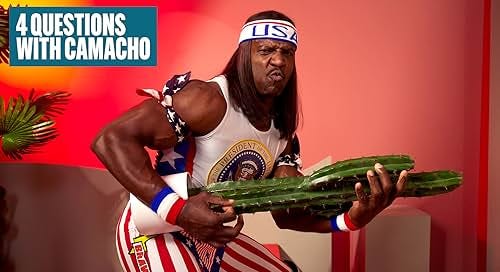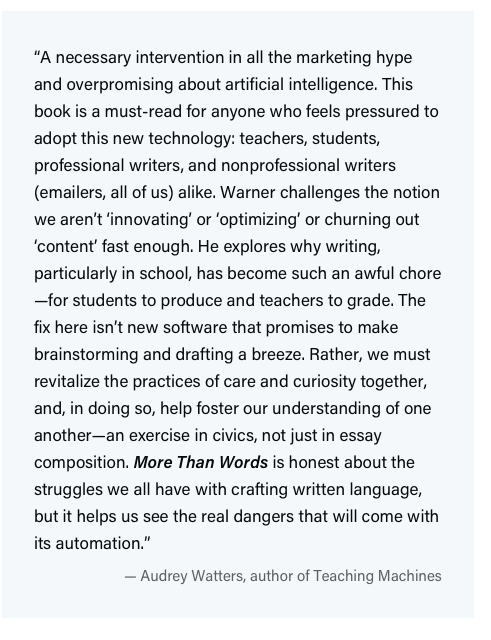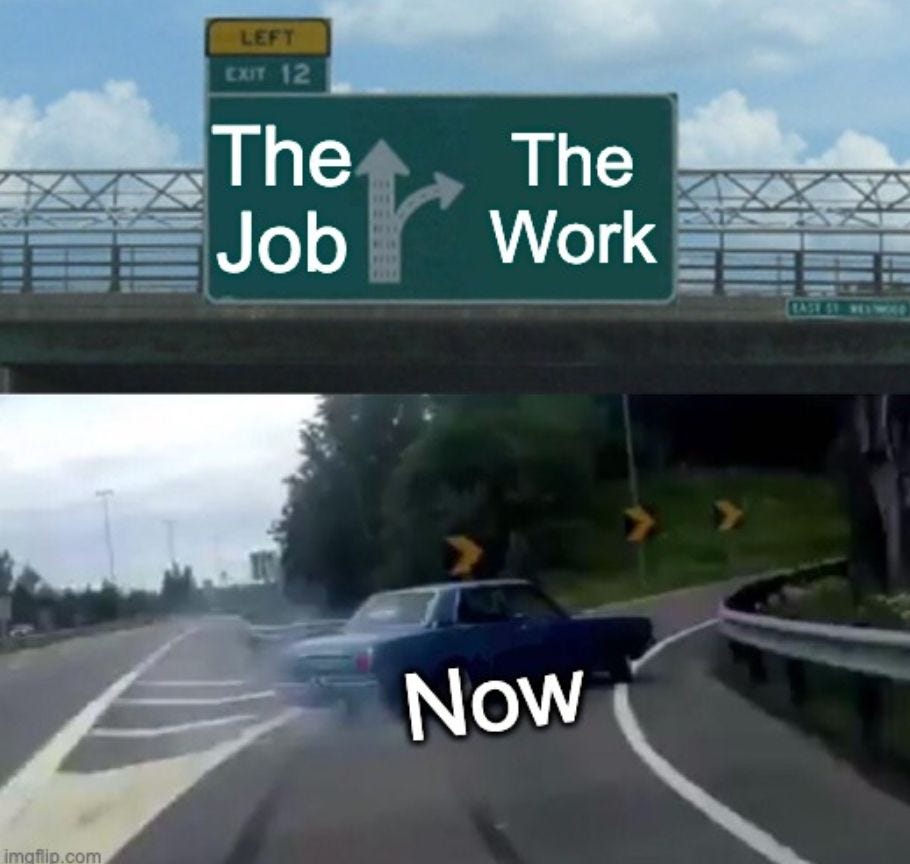To Cleave
As a writer type, I’ve always been interested in words that simultaneously carry contradictory or even opposite meanings.
Take the word “cleave,” for example.
“To cleave” means both to adhere to and to split apart. Here’s a famous adhere example:
Therefore shall a man leave his father and his mother, and shall cleave unto his wife: and they shall be one flesh. (Genesis 2:24)
Those who have read their Old Testament know that this is pretty much the last moment before the fall, when the serpent tempts eve with the fruit of knowledge. Before eating the fruit, Adam and Eve are a couple of free-range sybarites, all naked and stuff, and not feeling one bit bad about it.
After Eve takes the fruit and convinces Adam to join in, the big man shows up, pissed off since now Adam and Eve are all ashamed of their nakedness, and because of this, the Lord knows that they must have eaten from the tree. When He confronts Adam about it, Adam says, basically: “She made me do it. It’s her fault.”
And the man said, The woman whom thou gavest to be with me, she gave me of the tree, and I did eat. (Genesis 3:12)
A few verses later we learn that Adam’s sin was not eating the fruit per se, but actually listening to Eve.
Then to Adam He said, “Because you have heeded the voice of your wife, and have eaten from the tree of which I commanded you, saying, ‘You shall not eat of it’: “Cursed is the ground for your sake; In toil you shall eat of it All the days of your life. (Genesis 3:17)
As a non-believer, I put no stock in the stories of the Bible as scripture, but knowing something about the power of narratives to shape belief, we cannot help but notice these deep roots of misogyny and patriarchy.
Adam’s reaction is also an illustration of the impulse, when shit has been sent flying by the fan, covering all, to look around, point, and say “It’s their fault.”
There is a lot of “it’s their fault” going around in the election postmortems, some of which I find plausible, some of which seems spectacularly dumb (or obviously self-serving), but on the other hand, what do I know?
What does anyone know?
But one thing is clear putting aside whatever “what ifs,” we want to bat around about the campaigns themselves, or the qualms I might have about the institutional Democratic Party, an absolute, unmitigated, disgusting failure of a man has won an election against a (flawed, as we all are), yet exemplary woman.
Twice now.
To Consume
I actually came here to ponder a different word with multiple meanings, “consume.”
“To consume” is to “ingest,” and at a literal level, we must consume (food, drink) to sustain ourselves.
“To consume” is also “to use up” or “to destroy” completely as in “the fire consumed the house.”
When we are “consumed” with something, we are captured by it, obsessed and even controlled by it. “Consumed with envy.”
Tuberculosis was called “consumption” because of the way it literally ate at the afflicted’s lungs, leaving them looking moth-eaten.
Again, I can’t claim any kind of special knowledge or expertise in trying to understand what the hell is going on except that I think about this stuff a lot and sometimes write my thoughts down to try to make sense of them, but one thing I see underneath a lot of things happening right now is the long rise in the valuing of exercise of consumption over the importance of experiences.
I think we are/have been living through the age of consumption and among other things, it is hastening the ultimate destruction of the planet, while also seemingly making very few people happy. A well-centered populace in touch with what it finds deeply meaningful does not elect a Donald Trump.
Twice.
In a way, the decisiveness of Trump’s win this time as compared to 2016, which seemed like a fluke, should be clarifying. Whatever dark forces of racism, misogyny, and bigotry may lurk in the hearts Americans, it seems that the chief complaint was a sense that it’s too expensive to buy stuff.
Democrats were selling democracy, Republicans were selling consumerism, and consumerism won. Trump’s message was essentially that there are others who are in the way of your desire to have stuff and he is going to get them out of the way by deporting them or slapping tariffs on their goods or whatever. It never needed to make sense to be effective.
Trump is essentially a consumerist figure, even going so far as to relentlessly pump out literal crap - digital trading cards, ugly sneakers, commemorative plates - that his consuming fans buy. He is all appetite without constraints, including the law itself.
Apparently, purchasing a t-shirt with a stylized Trump posed like Rambo promising to take down the libs is a real thrill, the kind of thing worth living for.
It’s not like consumerism is confined to Trump-supporting Republicans. Taylor Swift has reportedly sold $2 billion in tickets to her Eras Tour. An additional $1 billion has been spent on TS merch. People were paid to stand in the lines at the tour merch booths.
None of this started with Donald Trump either. I recall, in the immediate aftermath of the 9/11 terrorist attacks, President George W. Bush taking to the airwaves and urging people to do their patriotic duty and go shopping. What Emily Stewart calls “patriotic consumerism” became a way of life.
Covid and subsequent inflation got in the way of our ability to consume and people are apparently angry enough about it to re-elect a man who has already proven to be terrible at the job.
This isn’t only about politics, though.
Consumerism, Competition, Education
This is something I’ve been exploring at my Inside Higher Ed column, but in my view, schooling has succumbed to a consumerist mindset, which has resulted in a “transactional model” that is making students, teachers, and parents miserable. When the purpose of school is to earn a credential predicated on what I call “indefinite future reward” it is not surprising that everyone will look for shortcuts around the work in order to arrive at that desired destination.
Except, psych! There is no destination, just another way station each step of the journey. Keep grinding away, surely the next stop will be a winner!
I was interested, but ultimately unsurprised to learn from
’s newsletter that New Trier High School in suburban Chicago has been suffering from “chronic absenteeism.” This is one of the wealthiest districts in the entire country where just about everyone is going to a four-year college. As reported in the Chicago Tribune and quoted by Daly, “the percentage of chronically absent students rose by class with just over 14% of freshmen, 21.4% for sophomores, 27.8% for juniors and almost 38% for seniors.”This makes sense. As students get closer to the finish line and it becomes clear that the next way station is going to be reached, being present in school is less important. Power down the engines and coast into the station. I’m guessing many of those absent New Trier students already know where they’re going to college, and also have parents who are willing to cover for their absences so they may avoid any disruption in terms of that trajectory towards their futures.
This is a world entirely divorced from the sense that school may be something worth experiencing for its own sake or because something valuable (like learning) may be lost if you are absent.
Is it any wonder that students might turn to ChatGPT to complete their homework without a second thought? We’ve told them what’s important - the credential - the route to that credential is immaterial.
If this orientation was resulting in people who are happy and fulfilled, maybe I’d have to shut up, but the evidence is that each generation of young people is more stressed, anxious, and unhappy than the last.
Orienting our school systems around making ourselves superior competitors in the race to consume doesn’t seem to have worked out. Now that we have a tool which can do school, we can’t even maintain faith in the integrity of that competitive structure.
Is this a crisis? I’d say so. I’ve been saying so since long before ChatGPT arrived.
Our system of education, particularly higher education, has been oriented around trying to drive individuals to compete for elite status. The rewards of achieving access to these elite spaces are real, not only because you are among other elites, but because we literally provide more public resources to the higher education institutions that have the most wealth.
Does this make any sense if the goal of a nation’s higher education system is to provide educational opportunities that lead to improved circumstances for as many people as possible? Of course not! But it is literally the system we’ve been living under for my entire lifetime.
I’ve spent much of my time writing about higher education simultaneously criticizing institutions while also shouting that these institutions (not just education, but also the press, the government, etc…) are the most important things we have when it comes to trying to improve people’s lives. I said so explicitly after Trump’s win in 2016.
The institutions have failed. They broke. They’re broken, and have been for quite some time. The competition feels (and in many ways is) rigged. This allowed Trump, in league with the world’s richest men, to be able to sell himself as the solution to the problem of competition by promising to make all of his supporters winners.
It’s bullshit, of course. It’s even more bullshit given that Trump and his Heritage Foundation cronies are eager to destroy the mechanism (the government) which could, at least in theory, improve the circumstances of these folks.
When voters were given a straight up or down verdict on two of the main priorities of the Project 2025 brigade - restricting abortion and universal vouchers - the views of the people they just put into power were soundly rejected.
Still, Trump and his billionaires made the sale.
Experiences Matter
While I will continue to try to support the work of the institutions I still believe to be important to helping people thrive, I also feel compelled to go deeper, to find a larger frame for how to organize my time and the focus of my work. It’s clear the institutions aren’t going to save us.
So this past week I’ve been trying to think through some things.
It is not lost on me that generative AI tools like ChatGPT are byproducts of consumption, while also requiring a consumerist culture to continue to thrive and ultimately find commercial success. These things have literally swallowed the world of text, and now are used to spit that world back at us as automated summarizations.
This has real potential utility in business situations were speed and efficiency are paramount.
But our lives, above evidence to the contrary, are not analogous to businesses. We are not uplifted by competing to achieve superior speed and efficiency. The sales pitch of GenAI is that the technology provides a shortcut to writing a song, making a movie, understanding a book, but these promises are illusions.
Writing a song is not defined entirely by the end product of having a song. The process is the point. Reading a summary of a novel is not the same thing as the experience of reading a novel.
Our lives are more than a series of transactions. We live through experiences, experiences which are unique to each individual, even when experiences may seem similar. Experiences matter. The alternative is to succumb to a world that looks a lot like Mike Judge’s Idiocracy.
I don’t know that I had this frame explicitly in mind when I started drafting More Than Words: How to Think About Writing in the Age of AI, but it’s where I wound up with the book, and it’s something I believe even more strongly as we get closer to the book’s release.
I’m excited and glad about what I’ve done with the book because, by instinct, I knew I wanted to write a book that wasn’t anti-AI so much as pro-human. It’s not enough to tell students not to use ChatGPT because it’s “cheating.” You have to make an affirmative case for the struggle of writing. Writing should be hard. That’s what makes it fun!
But for this to work, you have to value the whole experience, not just the outcome. As I said at IHE this week, we have to do the work, not just the job.
I see that once again I have ranged freely. I’ll tell you what, I was not particularly looking forward to trying to have something to say this week, but look what happened when I committed to just going with the experience. The only thing it consumed was my time, time that flew by to the point where I just realized I’ve been concentrating for almost three hours straight and now I’m hungry. I still feel plenty of dread for what might be coming, but I know that I’m not without voice as long as I choose to speak.
Links
This week at the Chicago Tribune I shared my appreciation for a new music biography, The Name of This Band is R.E.M. by Peter Ames Carlin. Look for a Q&A with the author as bonus content in the coming weeks.
At Kirkus, Tom Beer explores some creative ways that people are resisting book bans.
At LitHub,
finds some silver linings in recent book news.At the New Yorker,
author of Filterworld explores “the banality of online recommendation culture.” I trust the link to my thoughts about a culture predicated on consumption as the highest calling of human activity is clear.Some of these offerings from
may be too painful thanks to fresh wounds, but they are, as the kids don’t say anymore, on point.“I Don’t Hate Women Candidates. I Just Thought and Erratic and Vindictive Criminal Was Worthier of My Vote Than a Woman Candidate” by Devorah Blachor.
“Finally, The Elites Have Been Defeated by the Billionaires” buy Eli Grober
“Updates on the Arc of the Moral Universe” by Amanda Lehr.
Recommendations
While It’s likely that I’ve missed requests or misplaced emails asking for recommendations, to my knowledge, I have no fresh requests for reading recommendations in my inbox. I stand ready to fulfill your book recommendation needs with instructions at the link below.1
This week’s pre-publication endorsement for More Than Words: How to Think About Writing in the Age of AI comes from Audrey Watters, author of the indispensable book Teaching Machines: The History of Personalized Learning and the equally indispensable newsletter, Second Breakfast. You may want to pre-order the book before Trump’s tariffs kick in, given that a huge proportion of the books we read are printed in China and prices may be going up.
Take care everyone. I’ll leave you with an image shared with me by
who has a great newsletter of his own, The Broken Copier.JW
The Biblioracle
All books (with the occasional exception) linked throughout the newsletter go to The Biblioracle Recommends bookstore at Bookshop.org. Affiliate proceeds, plus a personal matching donation of my own, go to Chicago’s Open Books and an additional reading/writing/literacy nonprofit to be determined. Affiliate income for this year is $104.50.








Hmmm... Would you call your writing this week "The Weave?" ;-)
My daughter is in her final year of college and has been assigned several group projects in different classes. She was lamenting the fact that her other group members simply don’t want to do the assigned work. We were brainstorming why this was such a problem. You gave me the answer-they have all reached the next “destination”. They have jobs secured for after graduation, so why do the work? On another note, one member of one of the groups completely checked out for nearly three weeks because he was the social chair for his fraternity in charge of planning Hallow-weekend. I commented that his priorities seemed to be skewed, but then corrected myself in noting that his future is secured more by the frat contacts than the coursework.